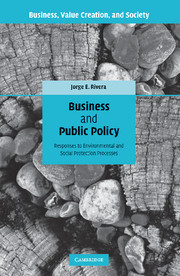Book contents
- Frontmatter
- Contents
- List of figures
- List of tables
- Foreword
- Acknowledgments
- Publication acknowledgments
- 1 Introduction
- 2 Business responses to the protective policy process in the US
- 3 Country context and the protective policy process–business response relationship
- 4 Firm-level characteristics and business responses to environmental/social protection demands
- 5 Is greener whiter? Resistance strategies by the US ski industry
- 6 Is greener whiter yet? Resistance or beyond-compliance by the US ski industry
- 7 Institutional pressures and proactive environmental protection: evidence from the Costa Rican hotel industry
- 8 Chief executive officers and proactive environmental protection: evidence from the Costa Rican hotel industry
- 9 Certified beyond-compliance and competitive advantage in developing countries
- 10 Conclusion
- References
- Index
2 - Business responses to the protective policy process in the US
Published online by Cambridge University Press: 03 May 2011
- Frontmatter
- Contents
- List of figures
- List of tables
- Foreword
- Acknowledgments
- Publication acknowledgments
- 1 Introduction
- 2 Business responses to the protective policy process in the US
- 3 Country context and the protective policy process–business response relationship
- 4 Firm-level characteristics and business responses to environmental/social protection demands
- 5 Is greener whiter? Resistance strategies by the US ski industry
- 6 Is greener whiter yet? Resistance or beyond-compliance by the US ski industry
- 7 Institutional pressures and proactive environmental protection: evidence from the Costa Rican hotel industry
- 8 Chief executive officers and proactive environmental protection: evidence from the Costa Rican hotel industry
- 9 Certified beyond-compliance and competitive advantage in developing countries
- 10 Conclusion
- References
- Index
Summary
The conceptual ideas discussed in this chapter build on policy scientists' work that has long emphasized the importance of taking a process perspective to understand policymaking (Clark, 2002; Lasswell, 1971). This chapter also follows sociology's neo-institutional scholars in drawing from Berger and Luckmann's (1967) phenomenological approach to understanding institutions and institutional processes (DiMaggio and Powell, 1983; Scott, 1991, 2001; Tolbert and Zucker, 1996). In particular, I borrow from Andrew Hoffman's seminal work (1997, 1999) studying the evolution of corporate environmentalism in the US chemical and oil industries between 1960 and 1993. His work illustrates the predominant pattern of business responses to the institutional dynamic associated with evolving environmental protection demands in the US: initially chemical and oil firms show high levels of resistance that over a couple of decades turns into cooperation and even proactive beyond-compliance. This change from resistance to cooperation arises from new understandings, metaphors, norms, and regulations redefining appropriate business protective practices that gradually become taken for granted. Important elements in this redefinition of legitimate business behavior include: stakeholders' demands, new environmental protection paradigms, external environmental crises, and industry-generated accidents (Hoffman, 1997, 1999).
I advance this work by detailing the specific nature of the protective policy process–business response relationship in the US. Most importantly, this book contributes to previous work by integrating the policy sciences and organizational sociology's neo-institutional literatures to outline an underlying phenomenological logic explicating changes in business responses to different stages of the protective policy process in the US.
- Type
- Chapter
- Information
- Business and Public PolicyResponses to Environmental and Social Protection Processes, pp. 9 - 43Publisher: Cambridge University PressPrint publication year: 2010

